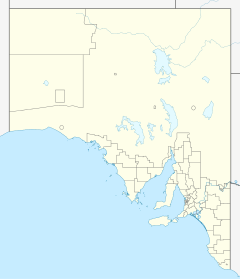Angorichina is a pastoral lease, 640 square kilometres (247 sq mi) in area, in the Flinders Ranges in the Australian state of South Australia. Its three small centres of population, disposed on an east-west axis 18 kilometres (11 miles) long, are Angorichina Station, Blinman, and Angorichina Tourist Village.


Angorichina Station
editThe lease was first taken up by Septimus Boord in 1853.[1] In 1859, the property was visited by the surveyors Selwyn and Goyder and by the Governor of South Australia, Richard MacDonnell. Later the same year a shepherd on Angorichina Station, Robert Blinman, first discovered copper and took out a mining lease which later became the Blinman mine.[2]
Walter Henry McFarlane acquired Angorichina in the early 1920s after disposing of Warrioota Station.[3] In 1941 the 1200-square-mile (3108 km2) property was carrying a flock of 38,000 sheep that produced 1300 bales of wool.[4]
As of 2021[update], Angorichina Station was still a working sheep station, covering hills, creek beds, gorges and saltbush. The 1860s-era homestead, 6 kilometres (4 miles) east of Blinman, also accommodates up to six visitors for an upmarket experience of a Flinders Ranges sheep station.[5]
Blinman
editBlinman, the small township within the pastoral lease had a population, in 2016, of 35.[6]
Angorichina Village
editThis small tourist village, 12 kilometres (7.5 miles) west of the Angorichina Station homestead, provides accommodation, a caravan park and some services. The site was originally established in 1927 as Angorichina Hostel by the Tubercular Soldiers Association as a sanatorium for returned servicemen of World War I.[1][7]
See also
editReferences
edit- ^ a b Manning, Geoffrey H. (2012). "A compendium of the place names of South Australia". The State Library of South Australia. Retrieved 10 January 2022.
- ^ "Angorichina Station". Flinders Ranges Research. 2012. Retrieved 25 August 2013.
- ^ "Obituary". The Advertiser. Adelaide: National Library of Australia. 9 January 1946. p. 5. Retrieved 9 August 2014.
- ^ "Travelling Around With Sunflower"". The Chronicle. Adelaide: National Library of Australia. 18 December 1941. p. 39. Retrieved 14 October 2014.
- ^ "Angorichina". The Tailor. 2022. Retrieved 11 January 2022.
- ^ "2016 census QuickStats: Blinman". Australian Bureau of Statistics. Retrieved 11 January 2022.
- ^ Wilson, John (2021). The train to Oodna-Woop-Woop: a social history of the Afghan Express. Banksia Park, South Australia: Sarlines Railway Books. p. 89. ISBN 9780646842844.
